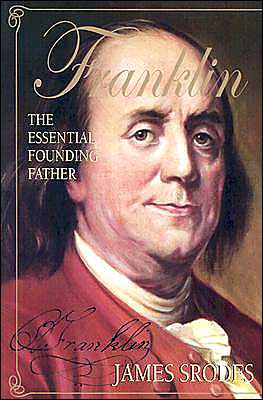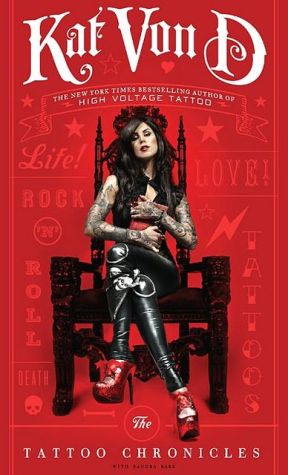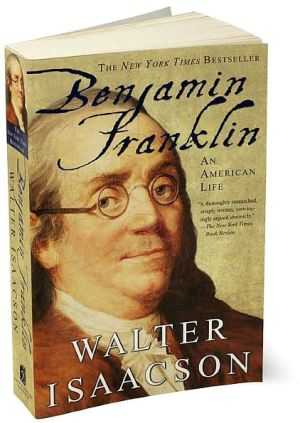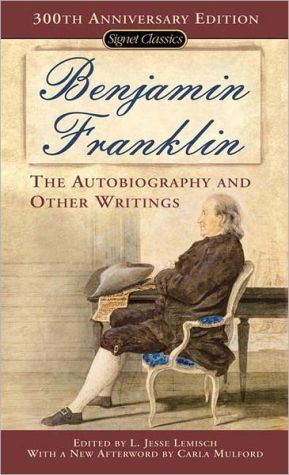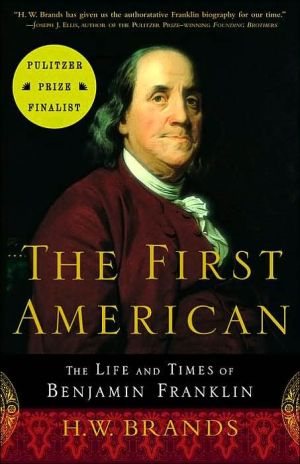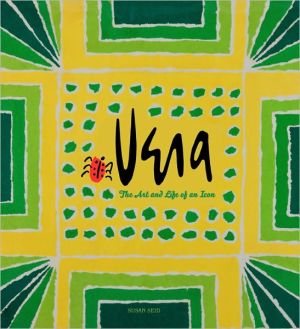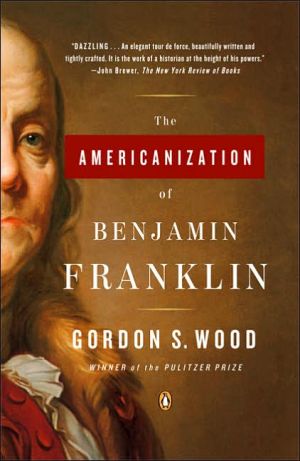Franklin: The Essential Founding Father
Franklin is a study of a man of ceaseless energies and remarkable accomplishments: an apprentice printer from Boston who made his name and fortune in colonial Philadelphia before having his greatest adventures in Europe's leading capitals, London and Paris. Here we find the complete Franklin - scientist, diplomat, tradesman, author, inventor, celebrated wit, spymaster, propagandist, military leader, quartermaster. Srodes offers insight into this complex man, showing us how Franklin's ability...
Search in google:
Historian and biographer James Srodes tells Franklin's incredible life story, making full use of the previously neglected Franklin papers to provide the most riveting account yet of the journalist, scientist, politician, and unlikely adventurer.Publishers WeeklySeasoned journalist Srodes (Allen Dulles: Master of Spies) charts Benjamin Franklin's "evolution from striving craftsman to daring diplomat, spy, and national master builder" in an account that situates Franklin as the "essential American." While acknowledging that the successful businessman, scientist, philosopher and social activist had his share of critics during his lifetime and after (D.H. Lawrence, for example, pronounced him "a sexual monster"), Srodes tends to grant such claims little time. Franklin's "malleable" temperament and the many talents he developed over his long life suited him well for his role as a catalyst for progress, Srodes writes: to Franklin, "the idea, not the sponsor, should be the point." When situating Franklin within the context of the conflicting public sentiments with which he had to deal New England and Virginian patriots, who disdained men from the middle colonies; William Penn's heirs, whom Franklin had to coax to share the cost of the French and Indian War; and the Quaker merchant elite, who considered Franklin's challenges to their ordered society dangerous Srodes approaches a more balanced portrait. Ultimately, the author contends, while other scientists and philosophers paralleled and even outdistanced Franklin, his greatest accomplishment was that he was the "ingredient that made change happen" and a man whose "best skills were to plot strategy in private and to write documents for public purposes." An extensive bibliography, some of it annotated, will assist interested readers in locating valuable primary and secondary sources for further study. (Apr.) Forecast: Regnery has a couple of big titles lately, and perhaps the enthusiasm for John Adams will spill over into demand for another founder. Still, this has to compete with last year's comprehensive The First American: The Life and Times of Benjamin Franklin, by H.W. Brands. Copyright 2002 Cahners Business Information.
Franklin\ The Essential Founding Father \ \ By James Srodes \ Regnery Publishing\ Copyright © 2003 James Srodes\ All right reserved. \ ISBN: 0895261049 \ \ \ \ \ Chapter One\ \ \ Traits and Prospects\ \ \ The Benjamin Franklin who dashed off to London in Pennsylvania's cause was a curious and untypical mixture of eighteenth-century colonial America. He was a town man in an overwhelmingly rural society. He aspired to power and influence but resented and goaded those already at the top. He baffled friend and foe alike with a public face of simple habits and a private taste for more of everything.\ He was, first of all, a Franklin. He inherited a range of traits that are one key to the mystery that has puzzled many biographers. The Franklin family's roots were firmly in the English craft classes, and yet they were never as humbly poor as Benjamin later pretended when he talked about his path to eminence. Josiah Franklin, Benjamin's father, was from a landowning Northamptonshire family of strong Calvinist belief. Early generations were farmers and blacksmiths, but later Franklins became skilled dyers of various cloths. Josiah was a silk dyer in the English market town of Banbury.\ In 1660, the restoration of Charles II to the English throne rekindled the turmoil between the establishment majority of the Church of England and Roman Catholic families loyal to the Stuarts. Confusing matters was a mix of other Protestant denominations from Presbyterians to Methodists to Quakers. Franklins were pious and fearless Congregationalists who believed that each village church should run its own affairs. Against the law the family kept their own Bible and hid it under a stool. They also held illegal home services with a lookout at the window to watch for establishment church informers.\ In 1683, twenty-six-year-old Josiah, wife Anne, and their three children immigrated to Boston with others in their community who looked to the Massachusetts colony for better opportunities and more religious freedom. The move at first seemed a mistake for Josiah: gaily colored clothing was not in line with drab Puritan fashions. As a result, Josiah shifted to the more necessary, but unpleasant, craft of being a tallow chandler--making soap and candles from boiled animal fat.\ It was a noxious business, as the boiling cauldrons threw off sickening fumes. Within five years, however, Josiah was able to rent a shop away from his home; he hung his trade sign with its large blue ball on High (now Washington) Street. He also settled his family into a rented house on nearby Milk Street just across from the Old South Church. As soon as he could, he applied to undergo the ten-year probation period for full membership in the church. From contemporary records we know he was an active and ardent participant at Old South, leading the chanting of hymns during services and holding prayer meetings at home during the week. This was at a time when the religious fervor that underpinned the founding of the Bay Colony was in decline. Only four out of ten Bostonians had formal church affiliation, and the port city (the largest in North America) was a violent stew of taverns and prostitution despite town leaders' regular efforts to keep order. For Josiah, church membership allowed him to practice his faith in the open for the first time.\ An active religious life was a valued passport into acceptance among Boston's influential class, and in the years to come Josiah would be selected to a series of positions of trust, including town constable and clerk of the market. Benjamin absorbed the need for a set of beliefs, but he came to spurn the rigidities of organized worship.\ Franklin men were a robust lot. Benjamin could well have been describing himself in this picture of Josiah that he included in his Autobiography:\ \ \ He had an excellent constitution of body, was of middle stature, but well set, and very strong; he was ingenious, could draw prettily, was skilled a little in music, and had a clear pleasing voice, so that when he played psalm tunes on his violin and sung withal, as he sometimes did in an evening after the business of the day was over, it was extremely agreeable to hear. He had a mechanical genius too, and, on occasion, was very handy in the use of other tradesmen's tools; but his great excellence lay in a sound understanding and solid judgement in prudential matters, both in private and publick affairs. In the latter, indeed, he was never employed, the numerous family he had to educate and the straitness of his circumstances keeping him close to his trade; but I remember well his being frequently visited by leading people, who consulted him for his opinion in affairs of the town, or of the church he belonged to, and showed a good deal of respect for his judgement and advice; he was also much consulted by private persons about their affairs when any difficulty occurred, and frequently chosen an arbitrator between contending parties.\ \ \ Benjamin apparently also inherited a robust sexuality. Before she died in 1689, in her thirties, Anne Franklin bore her husband seven children in all, though two died as infants--the last little boy outliving his mother by only six days. This left Josiah with five children who needed a mother. He moved quickly to pay court to Abiah Folger, a twenty-one-year-old daughter of an early Nantucket family who had moved to Boston and attended the Old South Church. Abiah married Josiah in Old South in November, five months after Anne's death. She would bear him another ten children, six boys (including Ben) and four girls.\ Benjamin inherited another trait from both parents: longevity. Abiah lived to be eighty-five; Josiah, eighty-nine. On the stone he later placed over their graves, Benjamin described his father as "a pious and prudent Man" and his mother as "a discreet and virtuous Woman." Neither had much time to be anything else.\ The Franklins were hard workers at an occupation that was sheer drudgery. Abiah, burdened as she was with a teeming household to run, managed to perfect a soap for bathing which became so popular that Benjamin twenty years later stocked a version in his shop in Philadelphia. The children, too, worked at the vats, and at least one set up his own chandlery. Josiah turned his hand to whatever made a profit. He won the contract to sell the candles to the night watch. He also allowed slave traders to schedule inspections and auctions of newly arrived Africans outside his chandlery; newspaper advertisements directed buyers to "the sign of the Blue Ball."\ \ \ Benjamin was the tenth, and last, of Josiah's sons. He was born in 1706 on January 6, a date he celebrated all his life even though the subsequent calendar revision moved it to January 17, the day we mark now. It was one of the coldest winters on record, but because the day was a Sunday, Josiah bundled Abiah and the baby out of bed and into the Old South Church for an immediate baptism--for a superstition held that a child born on the Sabbath had been conceived in sin on an earlier Sabbath. Yet the haste of the ceremony also could have reflected that Josiah meant for the babe to be his tithe to the church, destined for the clergy.\ The little house on Milk Street must have been in constant turmoil. Some friction was inevitable, for Elizabeth, the firstborn, was only eleven years younger than her stepmother; in all, thirty-four years would separate the eldest of Josiah's children from the youngest--Jane, who was born in 1712. Jane and little Benjamin formed a friendship that lasted all their lives. Childhood was a perilous time in those days. Three of Benjamin's older siblings died early, one drowning in an untended vat of soapsuds.\ Soon an older brother of Josiah, the namesake uncle of Benjamin, arrived from England in some disarray. This elder Benjamin Franklin also was a cloth dyer but had fallen on hard times; all but one of his ten children had died, and he had come to Boston for a fresh start and to prepare the way for his last son, a maker of cutlery, to join him. Josiah and his brother argued constantly while he lived with the family, but the uncle had a soft spot for his little nephew. He wrote acrostic poems based on his name and urged the boy to better govern his own headstrong, noisy nature.\ \ \ In later years, Franklin would recall there being thirteen people around the dinner table. Both parents were sober, pious folk, but there must have been some gaiety. Music and fierce conversation were an evening's recreation. Josiah Franklin worked all the hours he could to get ahead, but he also yearned for greater knowledge for himself and his family. Another of Benjamin's early memories was of regular guests invited from the community to eat dinner at the crowded table. The guests were men of business and religious affairs, and for their supper they were expected to discuss with Josiah the issues of the day or some question of church doctrine.\ While the men soberly weighed their comments, the children (and Abiah) were supposed to sit silently and absorb useful knowledge that they could not get from books. Benjamin later wrote:\ \ \ By this means he turned our attention to what was good, just, and prudent in the conduct of life; and little or no notice was ever taken of what related to the victuals on the table, whether it was ... of good or bad flavor ... so that I was bro't up in such a perfect inattention to those matters as to be quite indifferent to what kind of food was set before me, and so unobservant of it that to this day if I am asked I can scarcely tell a few hours after dinner what I dined upon.\ \ \ Books were an expensive luxury reserved for only the truly wealthy, but Josiah had a small collection of religious doctrinal tracts that he pored over to prepare himself for his endless debates over virtue. Not surprisingly, then, young Benjamin was an early reader. He recounts that he could not remember a time when he could not read, and his sister Jane said in later years that her brother could read parts of the Bible by the time he was three.\ Benjamin apparently was Josiah's chosen child. Although Josiah's seven other surviving sons had been sent off to apprenticeships as soon as possible, Benjamin was enrolled in the Boston Latin School at the age of eight to study religion and the classics. The course was to prepare him for the entrance examinations for Harvard College, the launching pad for any colonial clerical career. He was a quick success. After only eight months, he advanced to the head of his class, then to the one higher, and would have gone into yet a third class of study had his father not removed him. The excuse given was the expense, but Franklin later told his own son, William, that he suspected his father had changed his mind after taking a hard look at the clergyman's penurious life.\ Ben was then put into another school, this one specializing in writing and mathematics--more suited for the tradesman he was now to become. He did well for about another year. At that time John Franklin, the oldest son by Abiah, left his father's chandlery and moved to Rhode Island to go into business for himself. Ben was taken out of school and put to work cutting wicks and putting them into the molds for the hot wax; he tended shop, ran errands for his father, and disliked it all very much.\ There is a fretful fault line of impatience in the Franklin lineage. Josiah had taken his family to a distant land rather than compromise his religious beliefs. And then his first son born in Boston, also named Josiah, had rebelled against plans to apprentice him and run away to sea, where he was lost. Other sons were quarrelsome, especially James, who had learned the printing trade. Now here was young Ben, grumbling about the shop and threatening to follow brother Josiah to the glamorous life of a sailor.\ The father then did something remarkable for those authoritarian times. He walked Benjamin around Boston to visit the workshops and forges so the boy could see firsthand what carpenters, joiners, bricklayers, tinsmiths, cutlery makers, and other craftsmen did. At first Josiah pressed his son into a trial as an apprentice to his cousin Samuel Franklin, who made knives and scissors. But the cousin wanted a fee for taking the child in, and in the end the father decided to apprentice Benjamin to the boy's half brother James, a printer. The boy initially balked but finally agreed.\ \ \ James Franklin was twenty-one and the year before had returned from London, where he had learned his journeyman's skills in the metropolis's thriving print shops. He brought with him cases of type and a new press, and set up as a general printer of business documents and a seller of stationery and printed fabrics. This, by the way, tells us that the Franklin family had been able to acquire quite a bit of capital, or enough at least to obtain substantial credit. A new press and fonts of type could cost as much as £200--five years' earnings for a middling craftsman.\ The printing press was a truly revolutionary technology, even more so than the computer and Internet that have so transformed our society. European kings and church hierarchy were wary of the press from the start. Through nearly all of the seventeenth century, English kings forbade presses and type foundries except those licensed in London and at the established universities. Censorship was still a harsh reality well into the next century; jail, confiscation, and ruin were real threats to both writers and publishers. And one could be transported to the primitive colonies for writing what were judged treasonable utterances against those in power.\ The experience of the early American colonies stood in contrast. Before presses were licensed in any English provincial city, they were functioning in Boston, Cambridge, Philadelphia, and St. Mary's City, Maryland. In 1693, the year the English restrictions on newspapers outside London were lifted, the first press was set up in New York. Colonial newspapers were a natural by-product of the printer's art. They had to be licensed, to be sure--and were quickly suppressed if they were not--but they made lively reading and often were cautiously critical of the powers that were.\ Newspapers not only recorded local events but also reported on the politics, natural disasters, and commercial growth of far-distant colonies. More ambitious publishers developed relationships with printers in other towns and pilfered news from months-old magazines and papers from London. Equally important, the printers began to bind the economies of the colonial communities more closely. Each printer offered a line of commercial documents, bills of sale, contract forms, wills, deeds, and the like. The standardization of business practice came as ordinary citizens were growing more involved in the governing of their colonies.\ James Franklin, however, found that the fierce competition among Boston's many presses made it difficult to prosper. In 1719 the Franklin brothers took over the printing of the Boston Gazette, one of the city's two weekly newspapers, but after only forty issues they lost the contract.\ Life for an apprentice printer was pretty spartan even with a congenial master, which James was not. The two fretted each other from the start. As was the custom, James instructed Benjamin in the two distinct skills of being a compositor and being a pressman, the higher calling. The first required extraordinary hand-eye coordination and immense stamina. A compositor stood at upright cases of many little open drawers. Each drawer held pieces of lead type for every letter of the alphabet, both upper- and lowercase, plus all the punctuation marks and other graphic devices. The typesetter grasped in his left hand a long tray, called a composing stick, that was the length and width of whatever was to be printed, say a column of newspaper type. Looking at the handwritten copy that was to be set up, he used his right hand to flick among the many dozens of drawers, sliding the pieces of type into place on the composing stick--upside down and backwards. When full, the tray was unloaded onto a flat adjustable form, where it made a negative image of what the printed page would show. Once the printing was completed, the entire composing process had to be reversed and be done with even greater speed and total accuracy. Each letter had to be cleaned and put back into its drawer, lest the shop be thrown into an uproar.\ \ \ Continues... \ \ \ \ Excerpted from Franklin by James Srodes Copyright © 2003 by James Srodes. Excerpted by permission.\ All rights reserved. No part of this excerpt may be reproduced or reprinted without permission in writing from the publisher.\ Excerpts are provided by Dial-A-Book Inc. solely for the personal use of visitors to this web site. \ \
PrefaceixPrologue3Chapter 1Traits and Prospects11Chapter 2Hope and Glory33Chapter 3The Pursuit of Virtue47Chapter 4Rising Citizen63Chapter 5The Eminent Mr. Franklin79Chapter 6Join or Die103Chapter 7First Blood123Chapter 8A New Nemesis143Chapter 9Degrees and Separation155Chapter 10Rejection and Return169Chapter 11Back to London185Chapter 12Countdown to Revolution199Chapter 13The Death of a Dream219Chapter 14To the Brink of War239Chapter 15Revolution259Chapter 16Declaring for Liberty275Chapter 17The Diplomacy of War291Chapter 18Winning Recognition307Chapter 19Dismal Days323Chapter 20The Final Round339Chapter 21The Struggle for Peace355Chapter 22Home at Last371Epilogue389Notes395Bibliography409Acknowledgments417Index419
\ Publishers WeeklySeasoned journalist Srodes (Allen Dulles: Master of Spies) charts Benjamin Franklin's "evolution from striving craftsman to daring diplomat, spy, and national master builder" in an account that situates Franklin as the "essential American." While acknowledging that the successful businessman, scientist, philosopher and social activist had his share of critics during his lifetime and after (D.H. Lawrence, for example, pronounced him "a sexual monster"), Srodes tends to grant such claims little time. Franklin's "malleable" temperament and the many talents he developed over his long life suited him well for his role as a catalyst for progress, Srodes writes: to Franklin, "the idea, not the sponsor, should be the point." When situating Franklin within the context of the conflicting public sentiments with which he had to deal New England and Virginian patriots, who disdained men from the middle colonies; William Penn's heirs, whom Franklin had to coax to share the cost of the French and Indian War; and the Quaker merchant elite, who considered Franklin's challenges to their ordered society dangerous Srodes approaches a more balanced portrait. Ultimately, the author contends, while other scientists and philosophers paralleled and even outdistanced Franklin, his greatest accomplishment was that he was the "ingredient that made change happen" and a man whose "best skills were to plot strategy in private and to write documents for public purposes." An extensive bibliography, some of it annotated, will assist interested readers in locating valuable primary and secondary sources for further study. (Apr.) Forecast: Regnery has a couple of big titles lately, and perhaps the enthusiasm for John Adams will spill over into demand for another founder. Still, this has to compete with last year's comprehensive The First American: The Life and Times of Benjamin Franklin, by H.W. Brands. Copyright 2002 Cahners Business Information.\ \ \ \ \ Library JournalA journalist and author of Allen Dulles: Master of Spies, Srodes presents a biography of Benjamin Franklin in mostly favorable terms. He incorporates some heretofore neglected archival materials and concludes that Franklin was of much greater importance to the founding of an independent America than previous scholars have recognized. While his biography is enjoyable to read, the author's conclusions are overstated. Clearly, Franklin had a significant role in pre-Revolutionary America, especially as he encouraged the people to consider independence from England and as a member of the committee that drafted the Declaration. But his was not the only voice championing independence nor was it the most effective. Likewise, his presence at the Constitutional Convention was valuable, but he was not a critical player in the drafting of the document. Franklin was indeed a brilliant, energetic, and complex man, and one too often overlooked for his political accomplishments, which Srodes illuminates in a compelling fashion. Franklin may not be quite as great as Srodes portrays him, but neither is he as corrupt or self-important as his detractors suggest. The truth obviously lies somewhere in between. For those who have read David McCullough's John Adams, Srodes's Franklin provides an interesting complement. Libraries that already hold several other Franklin biographies might not need this one; however, if the other biographies are very dated, this is a fine way to upgrade holdings in this area. Thomas J. Baldino, Wilkes Univ., Wilkes-Barre, PA Copyright 2002 Cahners Business Information.\ \ \ BooknewsA celebratory biography of Benjamin Franklin by journalist Srodes. While he discusses Franklin's accomplishments as a printer and a scientist, the focus of the work is on Franklin's accomplishments as a political organizer and, later, as a diplomat. Srodes is of the opinion that American democracy owes a major debt to Franklin and that the American Revolution could not have been won without him. Annotation c. Book News, Inc., Portland, OR (booknews.com)\ \
